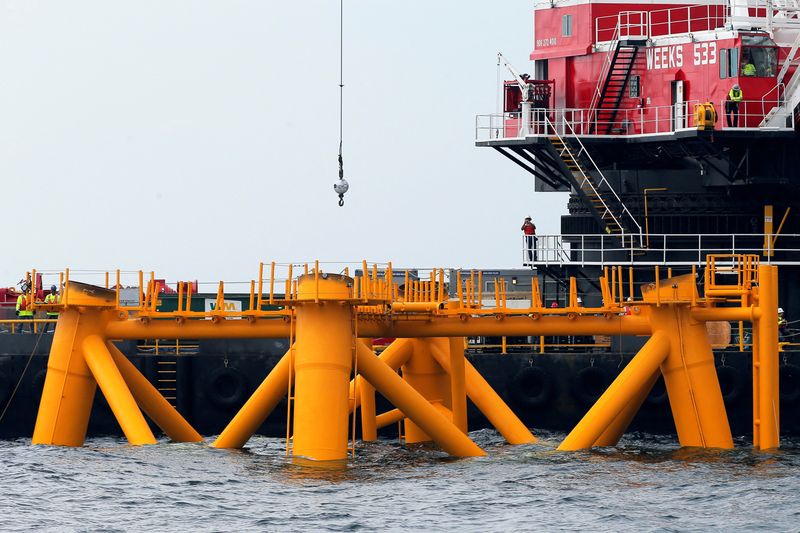By Nichola Groom
(Reuters) - A fleet of U.S. offshore wind projects central to President Joe Biden's climate change agenda may not move forward unless his administration eases requirements for subsidies in the year-old Inflation Reduction Act, according to project developers.
Norway's Equinor, France's Engie, Portugal's EDP Renewables, and trade groups representing other developers pursuing U.S. offshore wind projects told Reuters they are pressing officials to rewrite the requirements, and warning of lost jobs and investments otherwise.
"The components needed for our projects to progress simply do not exist in the U.S. at this time, and we see no signs that the supply chain will be ready in time to meet our procurement schedule," said David Marks, a spokesperson for the U.S. renewables division of Equinor.
Denmarks’ Orsted (CSE:ORSTED), a top offshore wind developer, warned last week that barriers to securing U.S. subsidies under the IRA, combined with soaring interest rates and supply chain delays, could lead to $2.3 billion in impairments for three projects, sending its stock plummeting.
At issue is a requirement in the IRA that clean energy projects seeking bonus tax incentives must be built with American-made equipment and sited in low-income communities.
Those provisions are key to supporting Biden's goals to reinvigorate U.S. manufacturing jobs through clean energy investments and to direct 40% of those benefits to disadvantaged areas. The credits are each worth 10% of a project's cost and can be claimed on top of the IRA's base 30% credit for renewable energy projects - bringing a total subsidy to as much as 50%.
But those standards are hard for offshore wind projects to hit given their reliance on overseas equipment and materials, and their locations in U.S. coastal waters.
U.S. Treasury rules specify, for instance, that towers for offshore turbines must be made entirely of domestic steel to win the domestic content credit. The first factory that would produce such a product, a facility in New York, was scheduled to open in 2025 but has encountered delays and cost overruns.
"You can't put requirements that no one can meet," David Jon Hardy, the chief executive of Orsted's operations in the Americas, said on a recent conference call.
The offshore wind industry already has looser requirements for claiming the bonus than other sectors, with domestic content required to make up just 20% of costs, compared with 40% for solar and onshore wind, according to the Treasury rules.
The credit for siting projects in "energy communities," defined as areas that have significant employment or tax revenues from fossil fuel industries and high unemployment, is dictated by where a project connects to an onshore substation.
Some developers want to see that expanded to include the location of port infrastructure that can provide jobs and economic benefits to a wider area, they said.
A U.S. Treasury spokesperson said the department was focused on implementing the IRA’s subsidies in a way that “follows the law and its underlying goals” and pointed out the incentives had already sparked billions of dollars in new investments.
The agency said its approach was meant to be challenging enough to incentivize investment in a U.S. clean energy supply chain over time.
Labor unions, a key constituency for Biden, have pushed Treasury to implement strict requirements for the domestic content bonus, according to comments submitted to the agency.
White House spokesperson Michael Kikukawa said the administration "is using every legally available tool to advance American offshore wind opportunities" and said the industry is creating thousands of union jobs in manufacturing, shipbuilding and construction.
JC Sandberg, chief advocacy officer for the trade organization American Clean Power Association, said easing the requirements for offshore wind, however, will be key to the administration meeting a goal to deploy 30 gigawatts of offshore wind along U.S. coastlines by 2030.
"The American offshore wind industry is attempting to go from 7 turbines to over 2,100 in 7 years but is meeting financial headwinds due to inflation, supply chain constraints, and permitting delays," he said in a statement.
"The Biden Administration has a historic opportunity to help solve these challenges.”
The industry said tweaks to the credit requirements were important not just for the projects, but for the domestic industry and jobs they will create.
"If the bar to achieve the bonus is too high... then, to be blunt, everyone loses," said Seth Kaplan, director of governmental and regulatory affairs at Ocean Winds North America, a joint venture between Engie and EDP Renewables.
